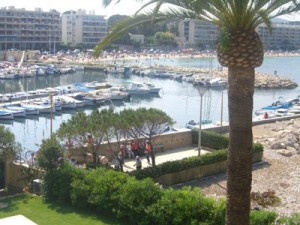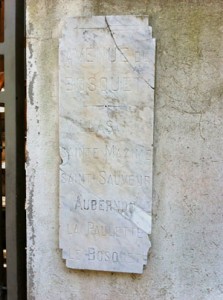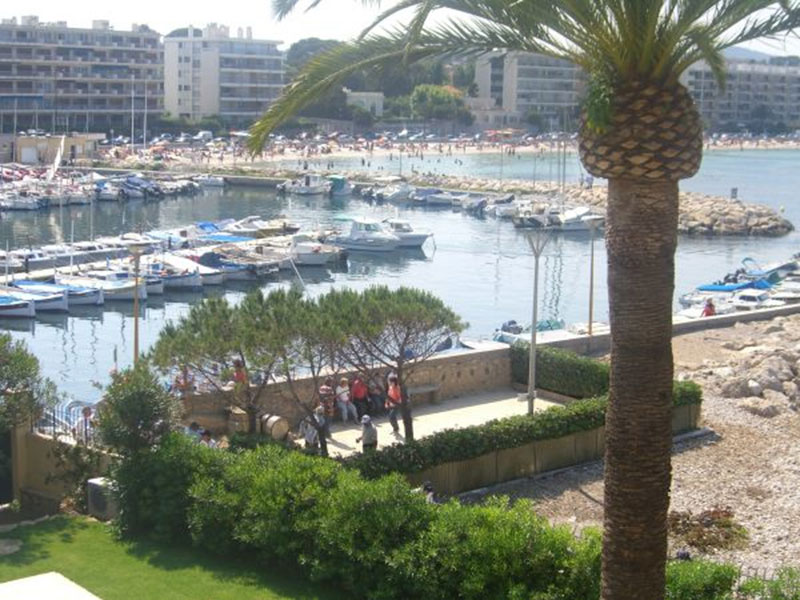Bellevue: A Modern Link to Guy de Maupassant?, my post a couple weeks ago, has generated feedback from several readers – this, after Philippe told me the blog lacked a certain punch. He was right. It probably did fall a bit limp. But if the story lacked a certain punch, it offered a certain content.

So, readers have been wondering, what happened next? Did I ever find out who built Bellevue, our beloved seaside villa in the Côte d’Azur that has attracted interest from passersby and celebrities alike? Was it the brainchild of Edouard Muterse, the man who looked back at me through wire spectacles in the photos from Antibes’ Archives Municipales – the guy who was Président in the 1930s of both the Bureau d’Hygiène Sociale and our neighbouring Port de la Salis, the one whose father gave accommodation and sailing lessons to the famed novelist Guy de Maupassant?
And not just facts, you wanted to know, but did I manage to track down any people with lucid memories and stories to tell?
The words of Emilie, the unusually helpful woman at the Archives, have rung clearly in my ears from the moment they arrived there. Antibes isn’t large, she said. There are a lot of people here who remember the past.
All data points gathered from the Archives Municipales were directing me, the guided missile, up the hill from Bellevue to a property called Le Bosquet – a place whose former name, when Maupassant stayed there in the winter of 1885-1886, was Villa Muterse. It was the home where, in his later years, Edouard Muterse lived – whether or not he was the one who actually built Bellevue. (I must not lose sight of this unfortunate possibility.) And Le Bosquet was the place where today, the Muterse family line lives on under the name Aussel.
“I don’t know if you’ll have the occasion to meet the father, Jean Aussel,” Emilie wrote to me in an email a few days after my visit to the Archives. She’d mentioned that the senior Aussel was in his early 80s these days, but as if in encouragement, her email described him as “a charming man and who always has a lot of things to say.”
Le Bosquet also was charming. But as much as I was drawn to the residence, I was also repelled. What would happen, I worried, if the current family knew nothing of their past? Worse, what if they didn’t want to tell it to some snooping American broad?
So I did what all curious people do at the birth of any particular interest: I googled it.
As it happens, Le Bosquet is partly a chambre d’hôte today. That’s to say it’s a bed and breakfast – with 4.5 stars, no less – run by Christian and Sylvie Aussel. I learned that the property’s bones date back to 1750, thanks to an ancestor who was the last Viguier du Roy (king’s magistrate, a position that survived until the French Revolution in 1789).
While the weight of Le Bosquet’s lineage only frightened me further, the online photos at least made the place look comfortable and charming. It had a flesh-coloured stucco façade, pale green shutters, matching green umbrellas and a rambling-but-tended garden. Exactly the kind of place you’d crave for some R & R.
This factoid about Le Bosquet being a B & B was incredibly fortuitous for someone who didn’t speak the local language perfectly. Francophone telephone conversations are a nightmare, contorting basic words into urgent-sounding jibberish – simply by removing the speaker’s face.

So one early afternoon, I convinced Philippe to take a bike ride with me up to Le Bosquet. He has the language skills – and the Quebecois charm. The French surrender their espressos and morning croissants for their long lost cousins. And in truth, even if Philippe wasn’t exactly a fan of that earlier blog post of mine, he admitted to being curious about the story behind it.
Shortly we stood at the gate of Le Bosquet. Actually that makes it sound too easy.
Shortly, after circumnavigating the private and blocked streets that surround Le Bosquet (which, I remind you, was supposedly a charming bed and breakfast), we found ourselves in front of an iron gate having a good dozen call buttons. Inside the barrier lay a long, straight street lined with olive trees. But nowhere, inside or outside the gate, was there the slightest announcement of a chambre d’hôte.
Fortunately one of the call buttons was marked “Le Bosquet”. After several rings, a barely audible, male voice answered.
Philippe made his opening bid: Bonjour, Monsieur! We purchased Bellevue a few years ago and we’re trying to discover its history, and my wife’s a writer – behind us a dump truck mounted the road in low gear – and anyway, she’s led to believe that an Edouard Muterse built our house.
The almost imperceptible voice said we probably want to speak to its father.
Philippe continued: Oui, yes, that’d be great. We were wondering whether we could take a minute or two now and make an appointment and…. Allo?
The call box was silent. Philippe rang again. No answer. But what luck: The pedestrian gate was open! We scooted inside.
At the end of the straight, olive tree-lined road, we found it: Le Bosquet – just like its online picture, but with almost every shutter snapped tight. The residence looked inviting but unwelcoming. We sensed people nearby – there was that voice on the call box, and some garden tools were splayed out in the shade – but still, the area felt vacant.
Philippe and I called out. “Allo? Bonjour?”
No one came to meet us. We resolved to try again at the main road – but on retracing our steps we discovered we were now locked inside the gated community. So again, google. Reception via satellite on a Canadian cell phone proved the superior technology. Someone would arrive.
When Christian Aussel finally emerged from Le Bosquet’s stately entry, he wore a spherical motorcycle helmet. It seemed to me a clever way to confine conversations with interlopers. He had a compact, wiry build; dark, round eyes; and an olive complexion. I guessed he was 50-something – at least as far as I could gauge within that space helmet.
Christian reiterated that we probably wanted to speak with his father, Jean Aussel, who was taking a nap at the moment. The best time to reach him was between 5:00 and 6:00 p.m.
Oui – merci – but Philippe and I could hardly leave it at that. Here we were, standing beside (though shielded by the astronomical headgear of) a relative of Edouard Muterse, the man I thought and hoped was the father of our Bellevue. Part of me, indeed, was that meddling history junkie that Christian aimed to avoid.
But kindly, Edouard’s great-grandnephew wasn’t too reluctant to offer some of Le Bosquet’s history. Yes, this was the place where Maupassant spent one winter. It was only a winter stay, he said, because the Muterse family lived at Le Bosquet during the summers. In winter they’d decamp to their city home near the train station.
Let me put this geography in context. We’re not talking about a winter home in Aspen and a summer home in St Tropez. Non. We’re talking about a winter home in Antibes and a summer home in – you’ve got it – Antibes. The distance between the two spots is about three kilometers. Of course airplanes didn’t exist in the 1880s (and for that matter, Aspen was basically a newborn, silver mining camp). Le Bosquet itself would’ve lain in the wilderness outside Antibes, a city that was still fortified (though not for much longer) by rampart walls and a vaulting access door that snapped shut each night at 8:00pm. This sort of country property was only comfortably inhabited during the summer months.
So I launch my million Euro question. Did Edouard Muterse build Bellevue?
He may have built Bellevue, Christian said, but when his father died (already having outlived Edouard’s mother), Edouard came to live in Le Bosquet. Christian had to spell out French tradition for us: Parents always live in the big house. When they die, the house belongs to their children.
Quick, mental arithmetic spun the arrow away from Edouard’ role as father of Bellevue. A few years ago, someone told us that his uncle laid Bellevue’s plumbing in 1923. Information at the Archives Municipales told me that Edouard’s father died in 1928. The brief, five-year interval between these years hardly supported the idea that Edouard Muterse would’ve created a grand, new home – one that at the time was described as a virtual castle – only to move out a few years later.
Edouard himself had no children, Christian said. We were still focusing on Le Bosquet. The fact seemed to explain the property’s current situation. In Edouard’s time the estate was a single, sprawling unit. Edouard’s niece (who married an Aussel) inherited the place in 1948, the year Edouard died. Her son Jean, now in his eighties and presently taking a nap, restored the property and today occupies the verrière, a vaulting, glass-roofed portion at the western end of the property. Christian runs the imposing, central part of the house as a chambre d’hôte, while his brother Denis lives in the eastern section of the building, once a fig séchoir (drying room).
Around this time the motorcycle helmet came off. Maybe Christian was enjoying our conversation more than he’d expected. Or, from the sweat pouring down his cheeks, possibly he was just hot. He was busy working out which house was our Bellevue. The one with the library and tower?
Yes.
The one on the water. It was more statement than question.
I have the drawing for the front door, Christian said. The guy who made it, Monsieur Mondini, is still alive.
Philippe was visibly floored by this revelation. I was a few sentences behind, still taking the word porte (i.e., “door”) to mean our neighbouring port. Soon, though, I realized the two men were talking about the magnificent, thick slab of walnut at the front of Bellevue that has intrigued us for years. It groans on its hinges, Adams Family-style, and still took an eight inch-long, iron key until our modernizations.
Philippe underlined the door’s beauty. In the early days of our renovations, he explained to Christian, Bellevue had no surrounding gate. A Russian actually stopped by and offered something like EUR 14,000 for our door. Just the door!
Christian laughed. A Russian? If the guy offered 14, he said, we should’ve asked double!
Of course Philippe and I never sold Bellevue’s door. Surprising and interwoven as this connection over Bellevue’s porte sounds, Christian now owns Monsieur Mondini’s woodworking shop. Woodworking is his own trade, he explained. Bellevue’s plans were simply part of the business he purchased.
The stonework surrounding our groaning door contained another, possibly related mystery. The initials “RC” were engraved into the keystone at the top of the arch. Philip, our builder, had told us such initials traditionally belonged to a property’s original owner.
But “RC”, no matter how you morphed it, looked nothing like “EM”. Perhaps Christian held the answer to another of Bellevue’s mysteries?
Edouard’s great-grandnephew was now interested that we were interested. Do we know any local families in Antibes? he wondered.
Yes, I said, explaining that because our daughter attended school here for a year, we have the privilege of knowing local families. We don’t just hang out with expats, I told him.
We are lucky to know these people, Christian said. There aren’t so many of them.
In a city of 70,000 year-round residents, this last comment seemed strange to me. But Philippe understood. As ever with me and the French language, I was talking cross-purposes. (Philippe later explained that Christian referred to a different sort of local family: those with roots in Antibes. The true Antibois have lived here for generations. It was all about that deep-dwelling, French passion for le terroir – the land, and the values and mores rooted into it. The real Antibois represented fewer and fewer of Antibes’ population. And Christian was obviously one of them.)
Philippe and my “two-minute visit” was well and truly exceeded. But our connection should endure. Christian will come by to look at our door. We don’t want him to fix its endearing moan, but it’ll be useful if he could look at the little bug problem. I won’t mind a glimpse at the original drawings either. More importantly, Christian gave us the telephone number for his father, Jean.
As Philippe and I biked back down the hill toward Bellevue, I punched the air in victory. We found Le Bosquet! We talked to a real person who was related to Edouard Muterse! And we’re on the way to linking up with the fabulously interesting Jean Aussel!
And yet. And yet, I can repeat the closing line from that prior blog post called Bellevue: A Modern Link to Guy de Maupassant? I have yet to officially link Bellevue’s creation with the Muterse family. But now, more than ever, I’m keen to do so.

